41 label the cells and molecules involved in cell-mediated immunity
BIOL 1353 - Exam 4 - Mastering - Ch 17 Flashcards | Quizlet This complex serves to tag foreign cells and molecules for destruction by phagocytosis and complement. ... Put the steps involved in cell-mediated immunity in order. Part B - Label the cells and molecules involved in cell-mediated immunity Stopped Here Pr. 13. MicroFlix Activity: Immunology -- Summary of Adaptive Immunity ... Adaptive immunity | Immune response (article) - Khan Academy Cell-mediated immunity can be acquired through T cells from someone who is immune to the target disease or infection. “Cell-mediated” refers to the fact that ...
Immune System Responses in Cats - Merck Veterinary Manual The immune system then attacks that cell. Some white blood cells (B cells) recognize invaders, or antigens, directly. When a B cell recognizes and attaches to the antigen, it produces antibodies, which coat the surface of the virus or bacteria to stop it from multiplying or infecting other cells. This process is called neutralization.

Label the cells and molecules involved in cell-mediated immunity
MHC class II - Wikipedia MHC Class II molecules are a class of major histocompatibility complex (MHC) molecules normally found only on professional antigen-presenting cells such as dendritic cells, mononuclear phagocytes, some endothelial cells, thymic epithelial cells, and B cells. These cells are important in initiating immune responses . Immune System Notes: Diagrams & Illustrations | Osmosis NOTES NOTES IMMUNE SYSTEM INTRODUCTION TO THE IMMUNE SYSTEM osms.it/immune-system-introduction Includes organs, tissues, cells, molecules Protects from microorganisms, removes toxins, promotes inflammation, destroys tumor cells Two branches Innate, adaptive INNATE IMMUNE RESPONSE Nonspecific cells: phagocytes, natural killer (NK) cells; no immunologic memory "Feverishly" fast (minutes to ... T Cells and MHC Proteins - Molecular Biology of the Cell - NCBI Bookshelf antigen-presenting cells display three types of protein molecules on their surface that have a role in activating a t cell to become an effector cell: (1) mhc proteins, which present foreign antigen to the t cell receptor, (2) costimulatory proteins, which bind to complementary receptors on the t cell surface, and (3) cell-cell adhesion …
Label the cells and molecules involved in cell-mediated immunity. List of courses :: UC Irvine, UCI Open The math involved is basic. ... Lec 15. Immunology with Hematology: Immunity by B Cells & Antibodies (Lecture) (English) Immunology Lecture 15 Notes. Humoral Immunity (File ... Lec 17. Immunology with Hematology: T Cell-Mediated Immunity (Lecture) (English) BioSci M121. Lec 18. Immunology with Hematology: Bodily Defense Against Infection ... Genetic and antibody-mediated reprogramming of natural killer cell ... Of note, we 1.6 observed a slight trend toward a weaker elimination of WT cells GL183 than that of KbDbKO cells, suggesting that mouse Ly49 and 1.4 1-7F9 CD94/NKG2A inhibitory receptors that can recognize mouse KbD bKO-TgHLA / WT ratio MHC class I molecules on WT CFSE-labeled cells might still be 1.2 functional for the negative regulation of NK ... MCB 100 Homework #6 (Exam 3) Flashcards - Quizlet Put the steps involved in cell-mediated immunity in order. 1. In the lymph nodes, cytotoxic T cells encounter dendritic cells displaying epitope in MHC-I. The Tc cell is activated. 2. The active cytotoxic T cell (CTL) leaves the lymph node "looking" for infected host cells displaying the same epitope on their MHC-I. Innate and Adaptive Immunity - American Society for Radiation ... - ASTRO Adaptive Immunity The adaptive immune system is based on clonal selection of lymphocytes with antigen receptors (B cell receptors and T cell receptors). Antigen receptors are genetically rearranged clonal receptors that bind to antigen displayed in Major Histocompatibility Complex (MHC) molecules on antigen-presenting cells.
Roles of IFN-γ in tumor progression and regression: a review 29.9.2020 · Interferon-γ (IFN-γ) plays a key role in activation of cellular immunity and subsequently, stimulation of antitumor immune-response. Based on its cytostatic, pro-apoptotic and antiproliferative functions, IFN-γ is considered potentially useful for adjuvant immunotherapy for different types of cancer. Moreover, it IFN-γ may inhibit angiogenesis in tumor tissue, … Answered: Label the following: Femur * Head *… | bartleby Transcribed Image Text: Label the following: Femur * Head * Neck * Greater trochanter * Lesser trochanter * Medial condyle * Lateral condyle * Medial epicondyle * Lateral epicondyle * Linea aspera Tibia * Medial malleolus * Tibial tuberosity. Fibula * Lateral malleolus Patella 2 16 7 8 3 10 11 14 12 4 15 13 PDF Chapter 17: Adaptive (specific) Immunity - California State University ... Adaptive Immunity: 2 kinds Humoral & Cell-mediated • Humoral immunity: mediated by antibodies circulating in the blood. -B cells • Cell-mediated immunity: -T cells Humoral Immunity B cells •are lymphocytes (leukocytes of the lymphoid lineage) • are produced & differentiate in (human) bone marrow • Subsequently, they circulate ... A&P 2, Unit 2, Chapter 22 Homework Flashcards | Quizlet Cell-Mediated Immunity: Cytotoxic T-lymphocytes CD8 cells Perforins and granzymes Both: Helper T-lymphocytes Plasma cells MHC-II. Drag each label into the appropriate position to identify what type of immunity is classified by each label. ... the pathogen from contacting and damaging human cells. Small pathogenic molecules that are soluble are ...
Answered: Drag each cell into the appropriate… | bartleby Drag each cell into the appropriate position to identify whether it is associated with antibody-mediated immunity, cell-mediated immunity, or both. Antibody-Mediated Immunity Perforins and granzymes B lymphocytes Cytotoxic T cells Cell-Mediated Immunity Helper T cells Memory T cells Plasma cells Both CD8 cells APCS Next> 29 of 83 Prev. White Blood Cells - Leucocytes - Lymphocytes - TeachMePhysiology T cells form in the bone marrow but mature in the t hymus. They are part of the adaptive immune system and are involved in cell-mediated immunity. Once active, Cytotoxic T cells can directly attack infected cells. In addition, helper T cells have many functions including activating B cells and forming memory T cells which respond on re-infection. T Cell-Mediated Immunity - Immunobiology - NCBI Bookshelf Cell-mediated immune responses involve the destruction of infected cells by cytotoxic T cells, or the destruction of intracellular pathogens by macrophages (more...) The activation of naive T cells in response to antigen, and their subsequent proliferation and differentiation, constitutes a primary immune response. Blocking CD47 promotes antitumour immunity through CD103 1.8.2022 · Methods. The infiltration of CD103 + DCs and NK cells were analysed by immunohistochemistry and immunofluorescence in both human and murine HCC specimens. An orthotopic liver tumour model was used to evaluate the function of the CD103 + DC–NK cell axis after CD47 blockade in vivo in wild-type, Rag1-/-, Batf3-/-, and STING1-/-mice. Phagocytosis …
Human γδT-cell subsets and their involvement in tumor immunity - Nature γδT cells are a conserved population of innate lymphocytes with diverse structural and functional heterogeneity that participate in various immune responses during tumor progression. γδT cells...
Immune responses to bacteria | British Society for Immunology Th1 cells predominantly produce interferon-g ( IFN-g ), which promotes cell-mediated immune mechanisms (see below). Th2 cells produce mostly interleukin-4 ( IL-4 ), which promotes humoral immunity by activating B cells. B cells make antibodies that stick to extracellular bacteria and prevent their growth and survival. Via cell-mediated immunity
Frontiers | Tumor-specific T cell-mediated upregulation of PD-L1 in ... The PD-1:PD-L1 axis is a binary interaction that delivers inhibitory signals to T cells, impeding both immune surveillance and response to immunotherapy. Here we analyzed a phenomenon whereby tumor-specific T cells induce PD-L1 upregulation in autologous MDS cells in short-term culture, through a mechanism that is cell-contact-independent and partially IFNγ-dependent. After investigating a ...
T-cell activation | British Society for Immunology Signal Two. In addition to TCR binding to antigen-loaded MHC, both helper T cells and cytotoxic T cells require a number of secondary signals to become activated and respond to the threat.In the case of helper T cells, the first of these is provided by CD28.This molecule on the T cell binds to one of two molecules on the APC - B7.1 (CD80) or B7.2 (CD86) - and initiates T-cell proliferation.
Analysis of A Natural Killer Cell Target Cell Antigen Cellular immunity mediated by nonspecific cytotoxic cells (NCC) in catfish and natural killer cells (NK) in mice and humans will be analyzed and compared. This unique approach will be accomplished with monoclonal antibodies (MAbs) which have been derived against target cell antigens involved in the recognition function of NCC and NK.
T Cell-Mediated Antitumor Immunity Cooperatively Induced By TGFβR1 ... For cell type identification, we used SingleR (version 1) and applied the pre-labeled "Single-Cell Analysis of Pancreatic Ductal Adenocarcinoma" data set from Elyada and colleagues as reference . SingleR was trained to label new cells from our dataset based on similarity to the reference marker genes.
Natural killer cell - Wikipedia Natural killer cells, also known as NK cells or large granular lymphocytes (LGL), are a type of cytotoxic lymphocyte critical to the innate immune system that belong to the rapidly expanding family of known innate lymphoid cells (ILC) and represent 5–20% of all circulating lymphocytes in humans. The role of NK cells is analogous to that of cytotoxic T cells in the vertebrate adaptive …
Label the cells and molecules involved in cell mediated ... Nov 19, 2017 — Label the cells and molecules involved in cell mediated immunity drag the appropriate labels to their respecti… Get the answers you need, ...
Adaptive Immunity - Humoral and Cellular Immunity - Healio There are two main mechanisms of immunity within the adaptive immune system - humoral and cellular. Humoral immunity is also called antibody-mediated immunity. With assistance from helper T ...
Cancers | Free Full-Text | The Roles of Immune Cells in Gastric … 2 päivää sitten · Those cytokines play an essential role in activating cell-mediated immunity and orchestrating B-cell mediated humoral immunity . Th9 cells secrete interleukin-9 (IL-9), which involves the orchestration of cell-mediated immunity [ 54 ], while Th17 cells produce interleukin-17 (IL-17), interleukin-21 (IL-21), and interleukin-22 (IL-22), which are pertinent in combating …
Granzyme K+ CD8 T cells form a core population in inflamed 15.6.2022 · T cell–derived pro-inflammatory cytokines are a major driver of rheumatoid arthritis (RA) pathogenesis. Although these cytokines have traditionally been attributed to CD4 T cells, we have found that CD8 T cells are notably abundant in synovium and make more interferon (IFN)–γ and nearly as much tumor necrosis factor (TNF) as their CD4 T cell counterparts.
IL-17 and IL-17-producing cells in protection versus pathology 5.7.2022 · IL-17 cytokine family members have diverse biological functions, promoting protective immunity against many pathogens but also driving inflammatory pathology during infection and autoimmunity. IL ...
18.1 Overview of Specific Adaptive Immunity - OpenStax The targeting and destruction of intracellular pathogens by T cells is called cell-mediated immunity, or cellular immunity. Figure 18.2 This graph illustrates the primary and secondary immune responses related to antibody production after an initial and secondary exposure to an antigen.
Natural killer cells: innate or adaptive immunity? or both? The cells of the mammalian innate immune system mediate the inflammatory response, triggered through activation of receptors on the cell surface of macrophages, dendritic cells, mast cells, neutrophils, eosinophils and NK cells.
Frontiers | Cell Adhesion Molecules and Their Roles and Regulation in ... In the center of all anti-tumor responses is the ability of the immune cells to migrate to the tumor site and to interact with each other and with the malignant cells. Cell adhesion molecules including receptors of the immunoglobulin superfamily and integrins are of crucial importance in mediating these processes.
The Immune System of Horses - MSD Veterinary Manual Specialized Cells and Molecules of the Immune System Physical Barriers The first lines of defense against invaders are mechanical or physical barriers. These include the skin, the cornea of the eye, and the membranes lining the respiratory, digestive, urinary, and reproductive tracts.
Nicotine Strongly Activates Dendritic Cell-Mediated Adaptive Immunity ... To assess endocytosis of the DC preparations, FITC-dextran was used according to a method described previously. 17 Briefly, cells stimulated with nicotine or unstimulated were incubated in complete RPMI medium with FITC-dextran at a final concentration of 1 mg/mL at 37°C for 30 minutes. Background staining at 4°C was used as reference.
Immune System Responses in Dogs - Merck Veterinary Manual The immune system then attacks that cell. Some white blood cells (B cells) recognize invaders, or antigens, directly. When a B cell recognizes and attaches to the antigen, it produces antibodies, which coat the surface of the virus or bacteria to stop it from multiplying or infecting other cells. This process is called neutralization.
Humoral vs Cell-Mediated Immunity | Technology Networks Cell-mediated immunity is primarily driven by mature T cells, macrophages, and the release of cytokines in response to an antigen. T cells involved in cell-mediated immunity rely on antigen-presenting cells that contain membrane-bound MHC class I proteins in order to recognize intracellular target antigens.
Enhanced inflammation and suppressed adaptive immunity in ... - Nature After immune cells labeling, the same blood samples were centrifuged at 1000× g for 10 min. The isolated plasma samples were used for the detection of cytokines using a kit (UB08PX), including IL ...
Small molecules targeting the innate immune … 1.12.2020 · The spontaneous sensing and prompt responding toward foreign invading DNA is a fundamental capacity of host defense. However, the underlining intrinsic mechanism remains complex and largely elusive. cGAS, STING and TBK1 are the key effectors involved in host defense, and the cGAS‒STING‒TBK1 axis is now appreciated as the major signaling pathway …
Solved Label the cells and molecules involved in | Chegg.com Question: Label the cells and molecules involved in cell-mediated immunity. Drag the appropriate labels to their respective targets. This problem has been solved! See the answer Label the cells and molecules involved in cell-mediated immunity. Show transcribed image text Expert Answer 99% (133 ratings) Th … View the full answer
Innate immunity (article) | Immune system | Khan Academy Cytokines are molecules that are used for cell signaling, or cell-to-cell communication. Cytokines are similar to chemokines, wherein they can be used to communicate with neighboring or distant cells about initiating an immune response. Cytokines are also used to trigger cell trafficking, or movement, to a specific area of the body.
Label the cells and molecules involved in cell mediated immunity ... The following are steps in the cell-mediated immune response. What is the correct sequence for these steps? A) Several cycles of mitosis occur.
T Cells and MHC Proteins - Molecular Biology of the Cell - NCBI Bookshelf antigen-presenting cells display three types of protein molecules on their surface that have a role in activating a t cell to become an effector cell: (1) mhc proteins, which present foreign antigen to the t cell receptor, (2) costimulatory proteins, which bind to complementary receptors on the t cell surface, and (3) cell-cell adhesion …
Immune System Notes: Diagrams & Illustrations | Osmosis NOTES NOTES IMMUNE SYSTEM INTRODUCTION TO THE IMMUNE SYSTEM osms.it/immune-system-introduction Includes organs, tissues, cells, molecules Protects from microorganisms, removes toxins, promotes inflammation, destroys tumor cells Two branches Innate, adaptive INNATE IMMUNE RESPONSE Nonspecific cells: phagocytes, natural killer (NK) cells; no immunologic memory "Feverishly" fast (minutes to ...
MHC class II - Wikipedia MHC Class II molecules are a class of major histocompatibility complex (MHC) molecules normally found only on professional antigen-presenting cells such as dendritic cells, mononuclear phagocytes, some endothelial cells, thymic epithelial cells, and B cells. These cells are important in initiating immune responses .

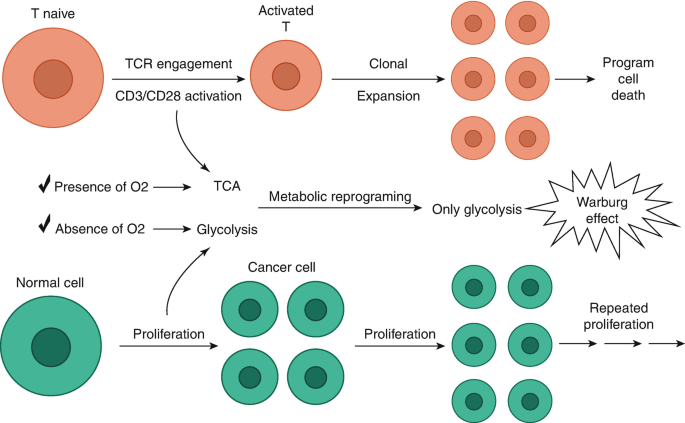



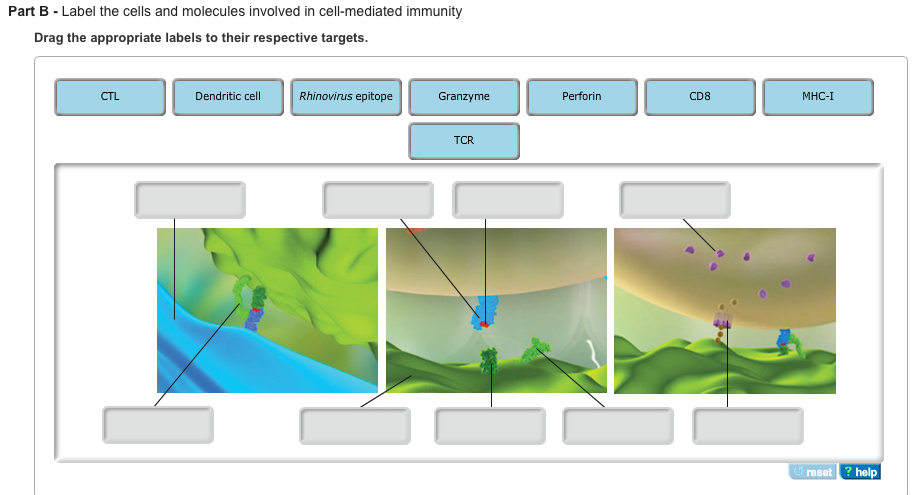


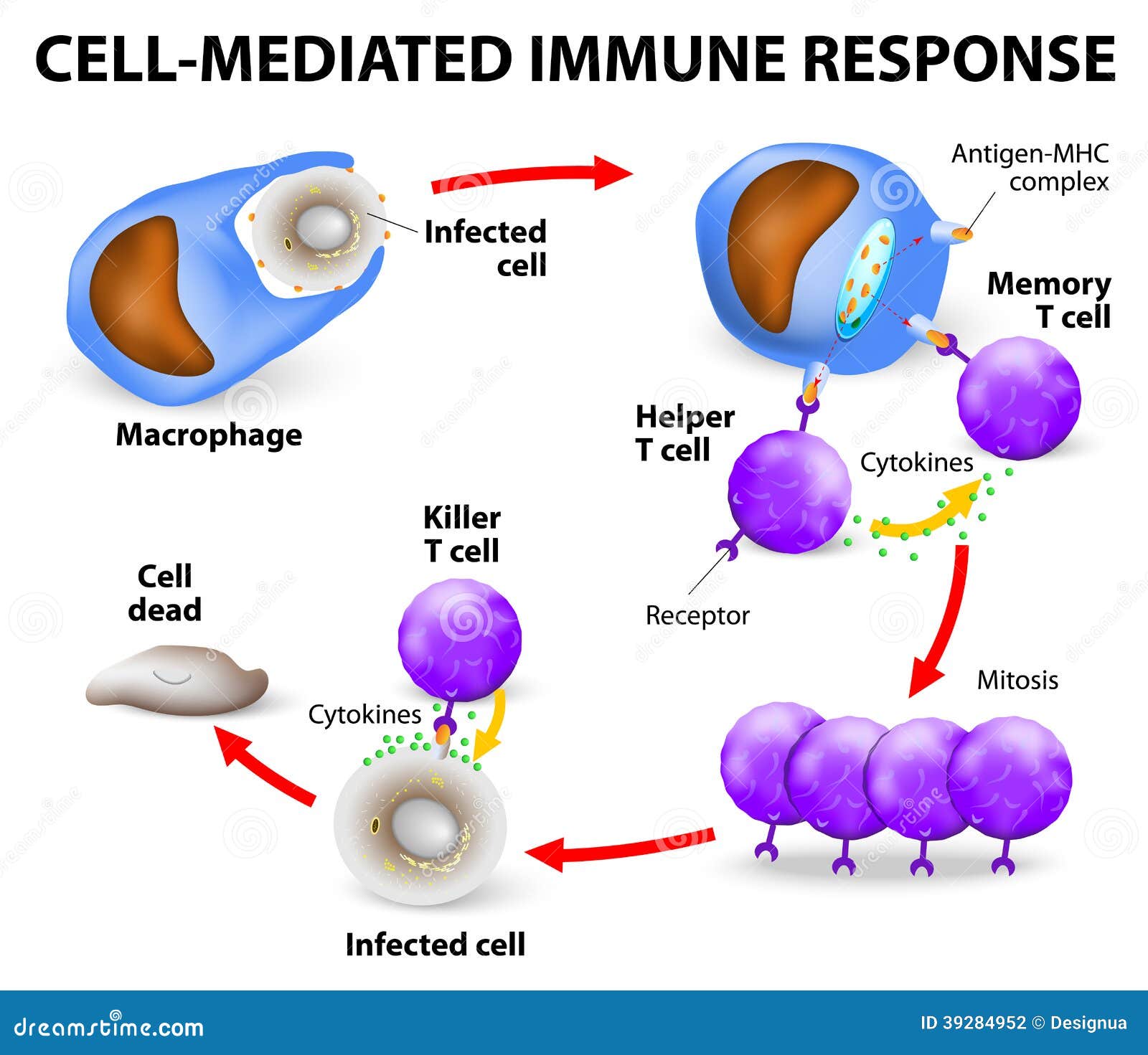
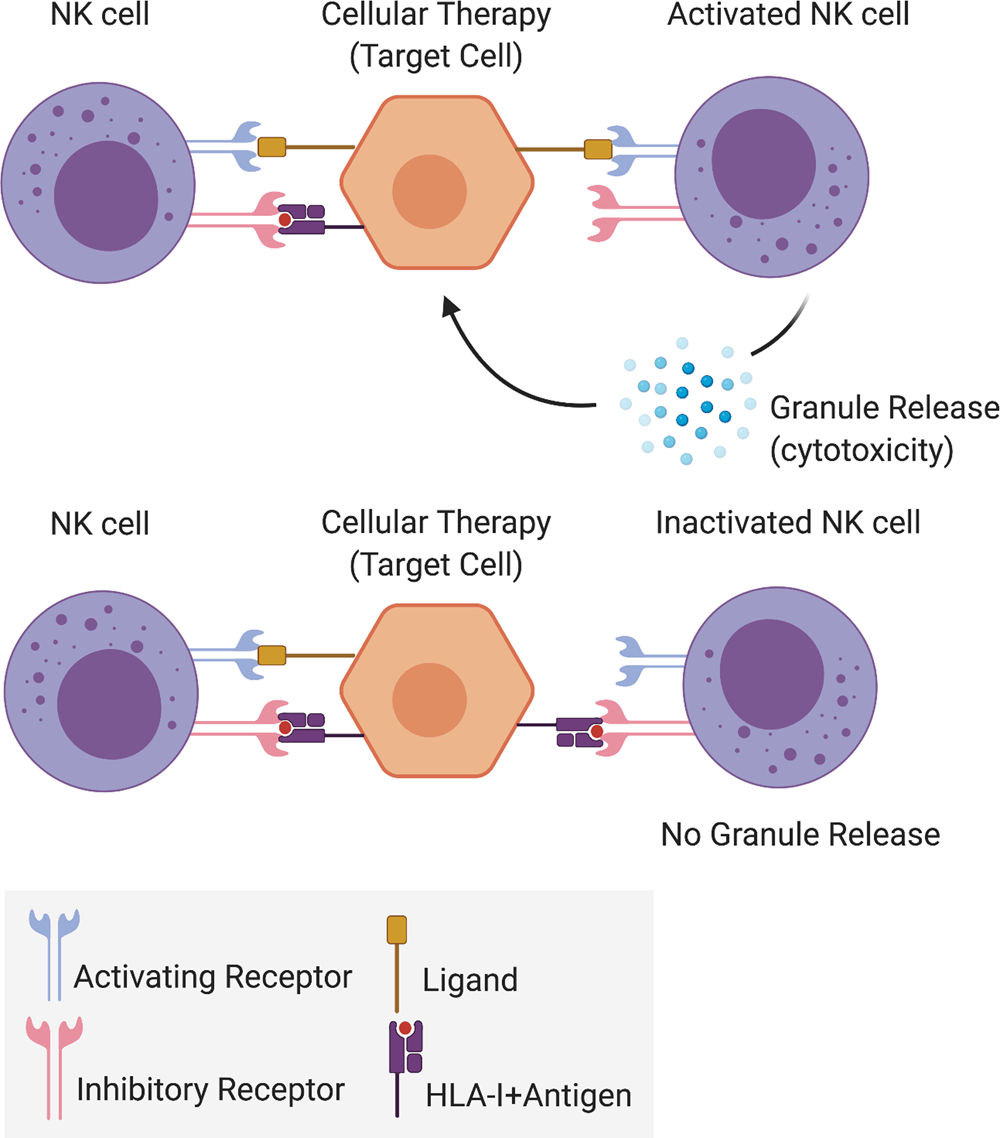

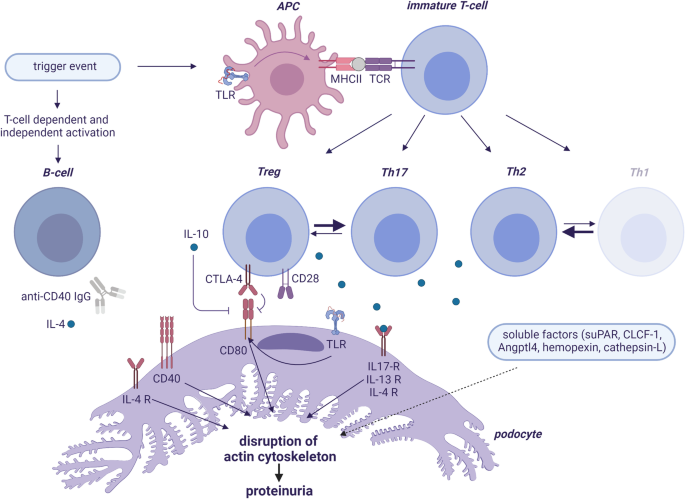

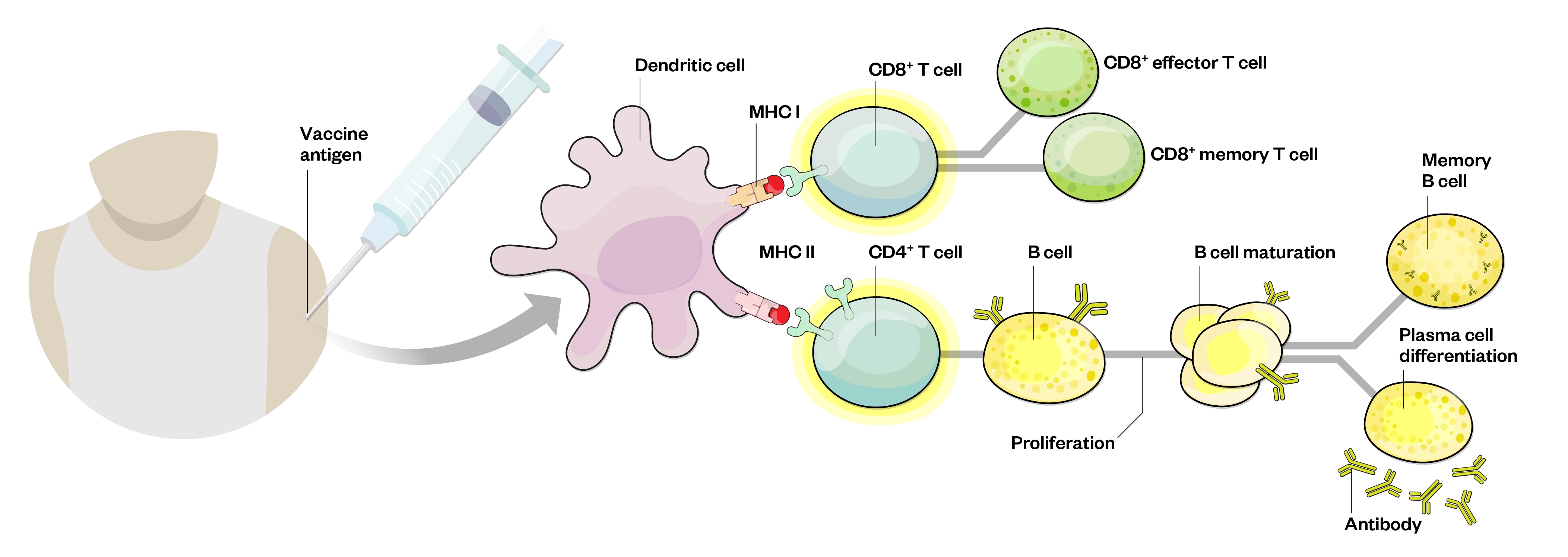
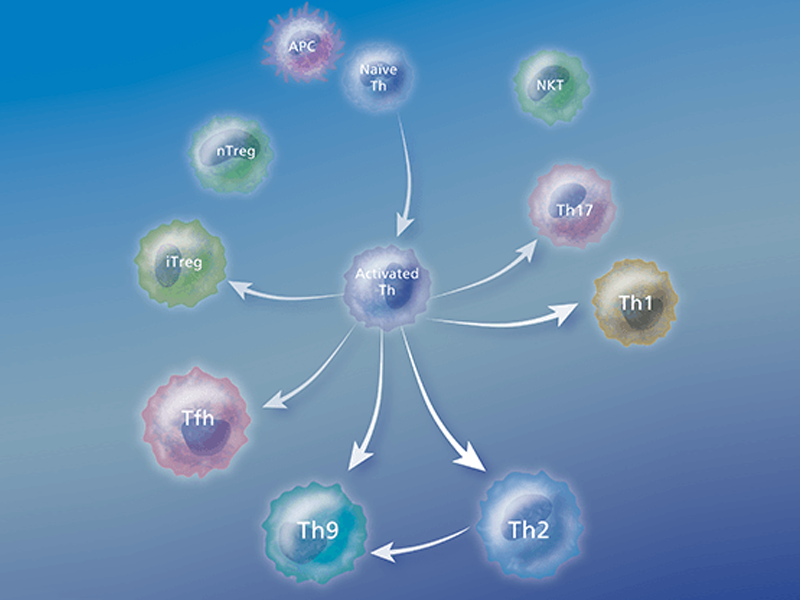


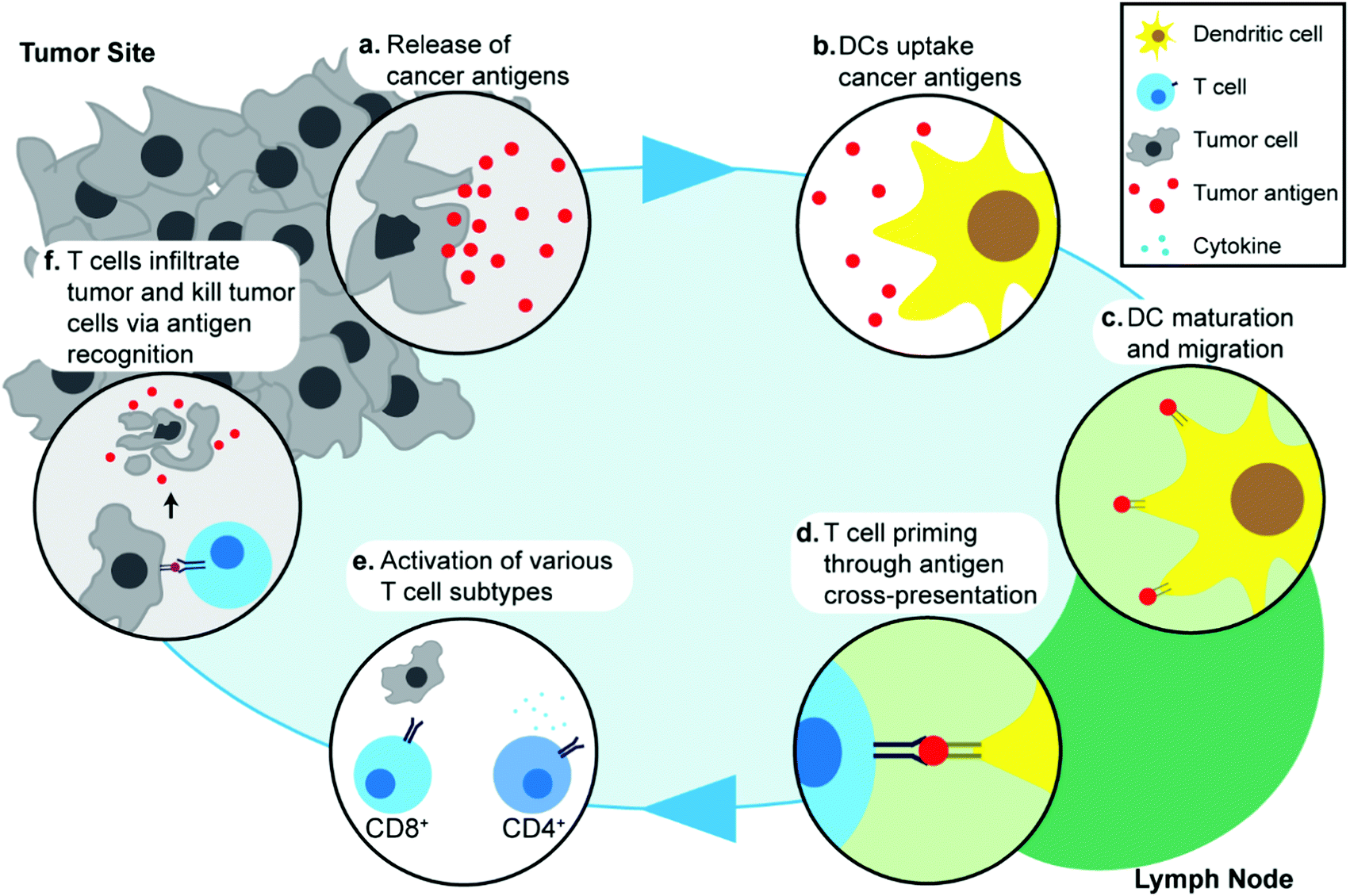
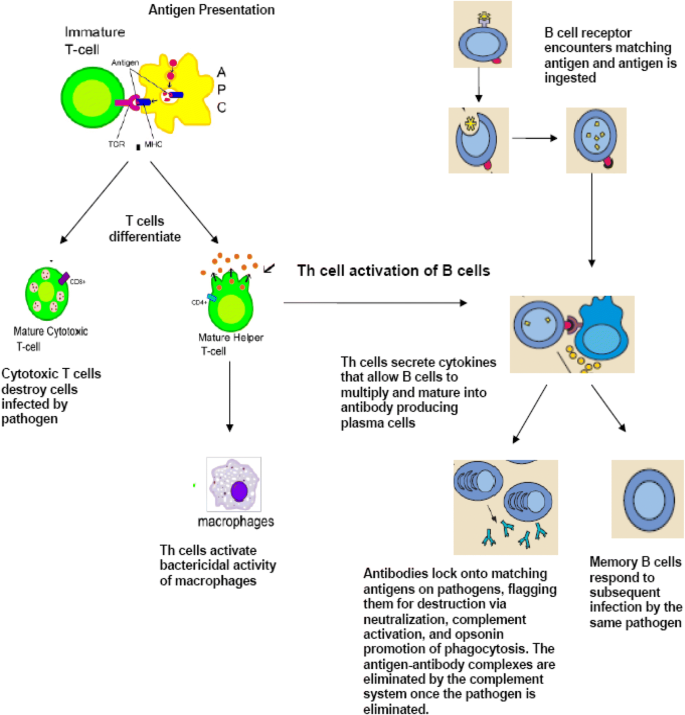









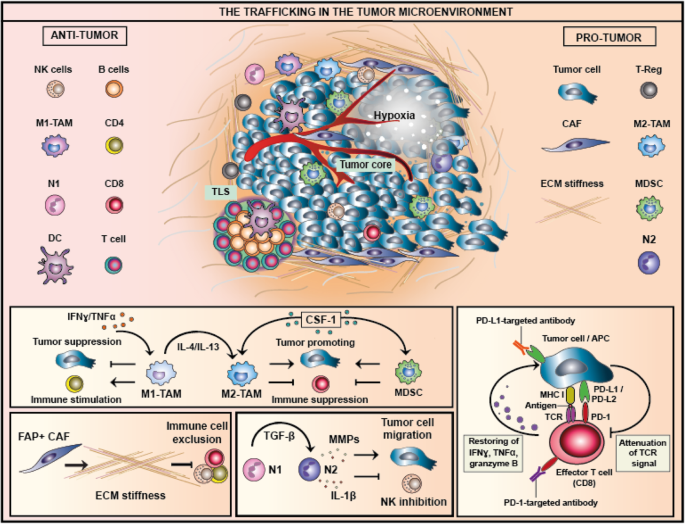
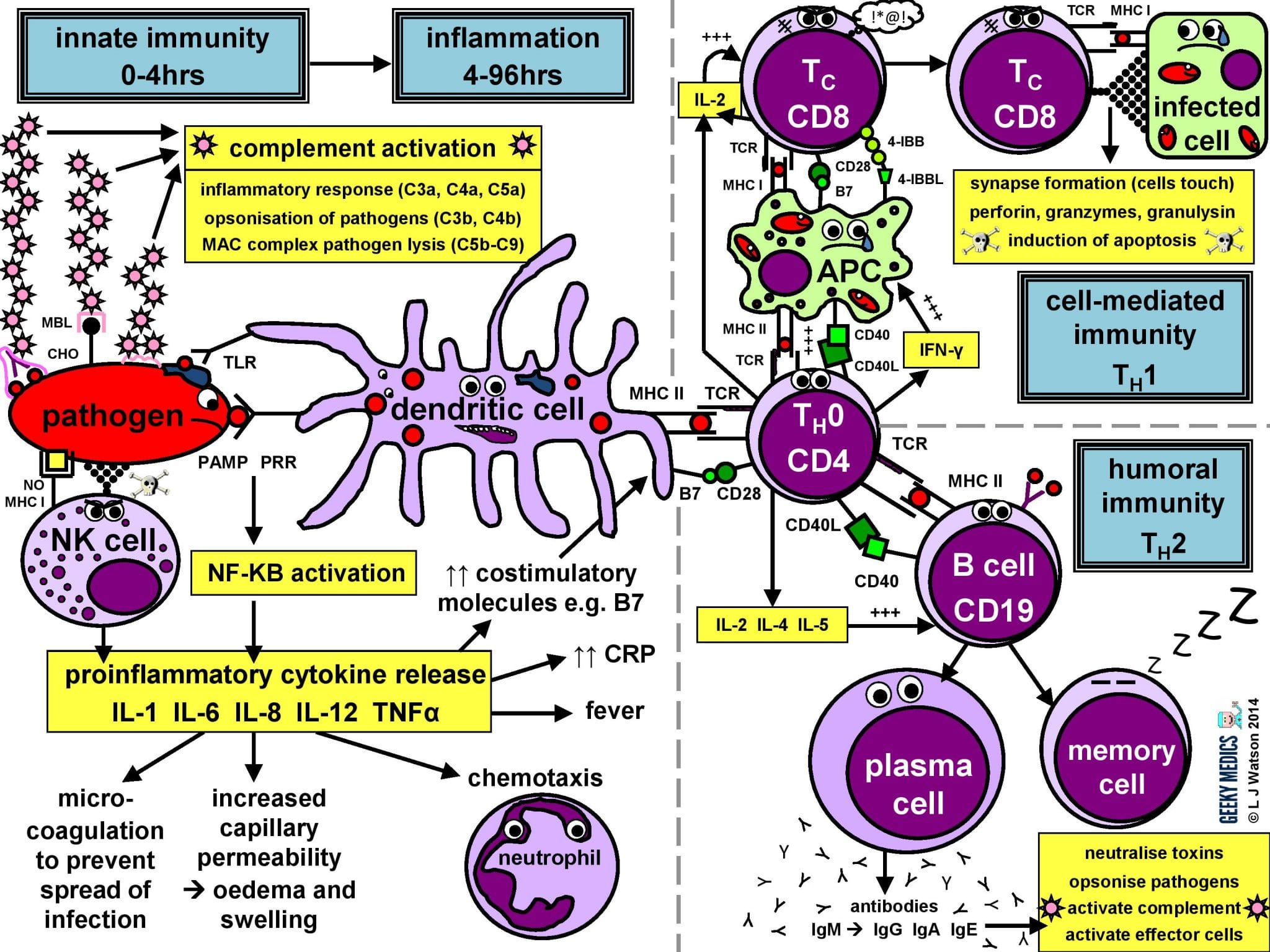



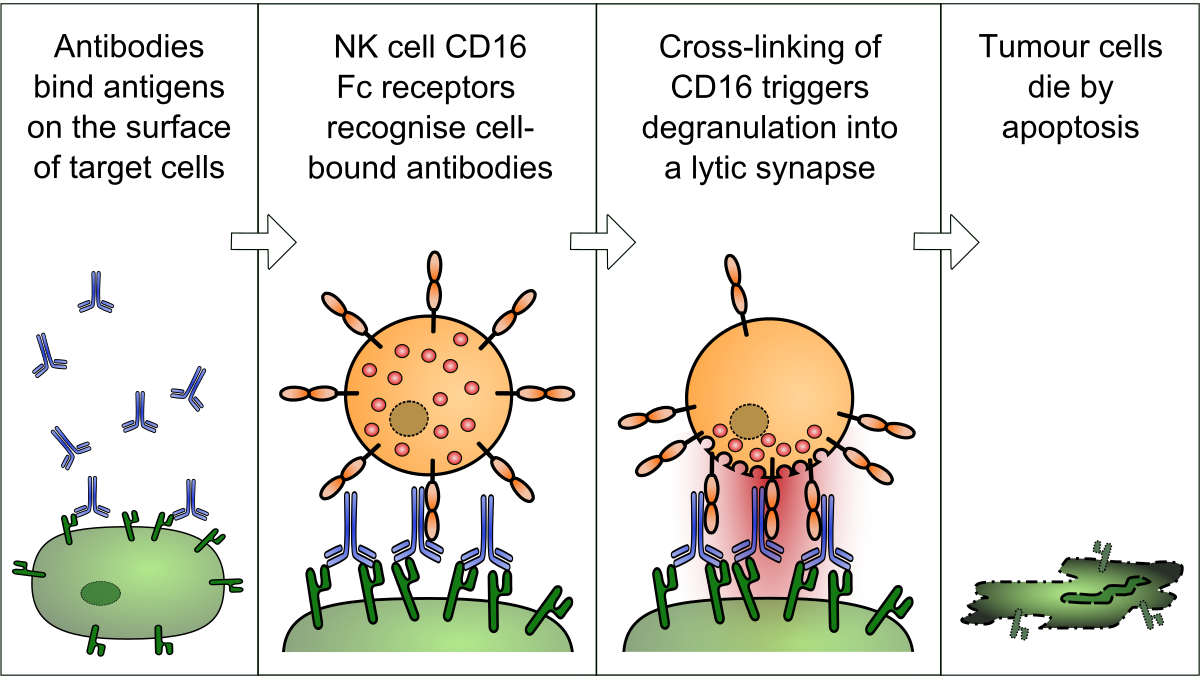
Post a Comment for "41 label the cells and molecules involved in cell-mediated immunity"